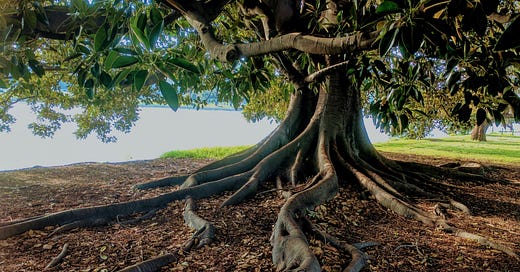Pursue what is meaningful, NOT what is expedient
Encouraging individuals to focus on actions that bring depth and significance to their lives, rather than those that provide immediate but fleeting satisfaction.
In our quick-fix culture, Jordan Peterson’s seventh rule in "12 Rules for Life: An Antidote to Chaos," offers a refreshing antidote.
Rule 7: "Pursue what is meaningful, not what is expedient"
This rule urges and reminds us to prioritise depth over speed, planting seeds that will grow over time instead of seeking the ephemeral pleasure of instant gratification.
The rule, like a wise old tree, casts a shade of profound lessons.
It suggests we prioritize long-term growth over short-term gains, an echo of the tree that patiently waits for years to bear fruit.
It encourages us to bear responsibility and make sacrifices, akin to the tree that stands tall through the changing seasons.
It leads us down a path of moral choices, where our ethical compass is our guide, much like the tree, steadfast, always growing upward.
Ultimately, the journey culminates in a life filled with purpose, resilience, and the ability to weather the storms of suffering - the tree standing tall and unbroken despite the harshest winds.
Our masonic teachings reflect these principles.
The cornerstone of Freemasonry focuses on the long-term development of character, much like a tree that matures over the years.
Responsibility and sacrifice, akin to the roots that anchor a tree, provide stability in our lodges, fostering community and personal development.
Masonic symbols, like the Square and Compass, mirror the tree's natural boundaries, reminding us to align our actions and desires with moral principles.
In Freemasonry, we consider ourselves ‘builders,’ aiming to create a more significant self and society, much like the tree that provides shade and fruit to its surroundings.
MASONIC COMMERCIAL
VW Bro Joe Corrigan DGIW recently flew a small aeroplane,
from Sydney, stopping 21 times before landing in London.
to raise much-needed funds for Little Wings.
Joe is hosting a Black Tie Banquet on Friday 11th August
to share his story & raise funds for Little Wings
CLICK HERE FOR TICKETS TO THE GALA LITTLE WINGS
OR CLICK HERE TO DONATE
Our trials, like the harsh seasons the tree endures, cultivate resilience, preparing us to overcome life’s adversities. Amid the suffering, we, like the tree, stand tall, committed to continual growth and improvement.
Ignoring these principles is akin to neglecting the nurturing of a tree.
Short-term thinking may lead to an unhealthy obsession with immediate gratification, much like a tree that bears fruit too early, only to be left depleted.
Avoiding responsibility and sacrifices might offer temporary comfort but ultimately lead to stunted growth.
Neglecting moral choices can lead to regret and a damaged reputation, akin to a tree losing its leaves.
Life without purpose could lead to confusion and existential crises, mirroring a tree that has lost its direction and is growing aimlessly.
Lack of resilience, like a tree with weak roots, leaves us unprepared for life’s storms.
The inability to manage suffering due to a lack of meaningful goals can heighten the risk of mental health problems, akin to a tree that withers under harsh conditions.
The wisdom of pursuing these principles becomes evident when we consider the richness they bring. Much like the gardener who nurtures the tree for its long-term benefits, we are encouraged to prioritize lasting success over fleeting rewards.
Embracing responsibility cultivates personal growth and reliability.
Upholding moral choices nurtures self-respect and trust from others.
Living a purpose-driven life gives direction, satisfaction, and meaning, much like the tree that grows towards the sun.
Building resilience prepares us for future adversities, just as a tree strengthens itself for future storms. And by pursuing meaningful paths, we, like the tree, develop healthier mechanisms to withstand life’s inevitable sufferings.
How do we integrate these principles into our lives?
Simple, actionable steps can guide us.
Set long-term goals in line with your core values and break them down into manageable tasks.
Assume responsibility in everyday life, meeting deadlines, maintaining health, and making amends when necessary.
Make conscious moral choices.
Seek a purpose that gives meaning to your life.
View challenges as opportunities for growth, and cultivate resilience.
Develop healthy coping strategies and ensure your actions align with your long-term goals.
In conclusion, Jordan Peterson's teachings and Freemasonry offer a roadmap to a meaningful life. Like a gardener who patiently tends to his tree, knowing it will bear fruit in due course, we too can apply these principles to our lives. By doing so, we can, like the tree, grow towards a life of purpose, resilience, and enduring fulfilment.





